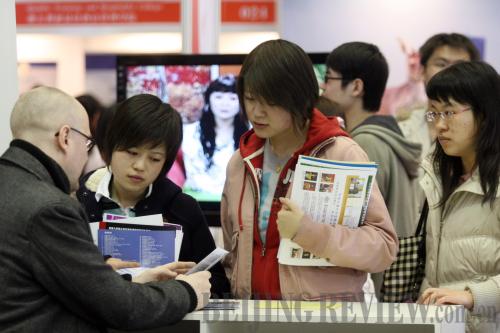 |
|
FUTURE OPTIONS: A foreign teacher answers questions at the 14th China International Education Exhibition Tour, a large-scale international education fair in Beijing (XINHUA) |
This year's summer in Henan Province has been a scorcher. To help beat the heat the students at Xinminjie Middle School raised money and bought air conditioners for their classrooms. The only hitch is that with all the money now used up they can't afford to run the air conditioners, as the cost of electricity is too high.
Ranked as the second best middle school in Weishi County, Xinminjie is facing a raft of difficulties brought about by the shortage of funds. "This year, the government budgeted spending to our school is 517 yuan ($76) per student. Basically it can only cover the cost of daily teaching activities, but there's no spare money to renovate the classrooms, hire young teachers and purchase office supplies," said Zhang Wenhua (not his real name), the school's deputy principal.
Zhang said the classroom has not been renovated for 23 years, and there are few young teachers in the school. "Fifty percent of the expenditure is on dining and receptions, and there is not much money [left] to be used on students," Zhang told ChinAfrica.
Xinminjie's dilemma mirrors the fate of many Chinese schools trapped by financial concerns. While government investment in education increases annually, the margin of increase is small. Statistics from the Ministry of Education show government spent close to 3.5 percent of the GDP on educationin 2008, much lower than the world's average level of 4.5 percent.
"We hope the government will attach more importance and take more concrete action on education," said Zhang. It seems his wish has been answered.